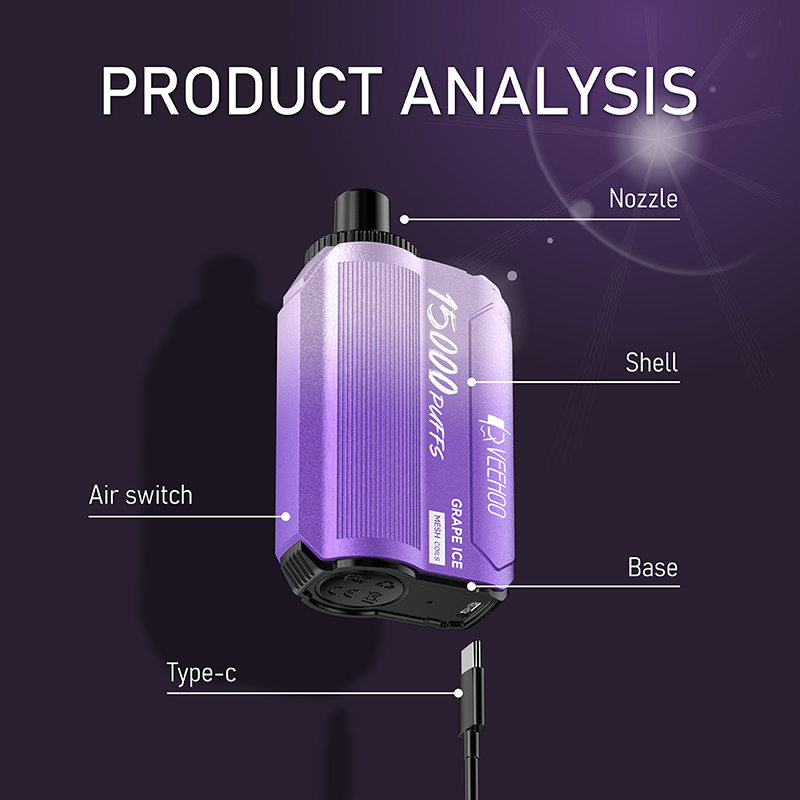The South Korean government recently announced a new smoking control policy, which has attracted widespread public attention. According to a joint announcement by the Ministry of Health and Welfare and the Ministry of Education, South Korea will further strengthen smoking control measures around schools, prohibiting the installation and operation of e-cigarette vending machines within a certain area around schools. This move is seen as another strong move by the government to protect youth health and prevent nicotine addiction. It also demonstrates South Korea’s determination to find a balance between regulation and the market amid the rapid growth of the e-cigarette industry.
In recent years, the proportion of young people using e-cigarettes in South Korea has been increasing. According to survey data from the Korea Centers for Disease Control and Prevention Agency, while the rate of traditional cigarette smoking has continued to decline over the past five years, e-cigarette use has seen a new increase among young people. This phenomenon has prompted government departments to realize that the convenience, variety of flavors, and unregulated sales of e-cigarettes in vending machines can all serve as channels for young people to be exposed to nicotine at an early age. Therefore, the South Korean government has decided to eliminate potential risk channels at the source. The ban focuses on preventing vending machines from becoming “hidden sales points” and preventing minors from circumventing age verification procedures to purchase e-cigarette products.
The announcement of the policy has received mixed reactions in South Korea. Some parents and education groups expressed strong support, believing it is a necessary measure to protect the healthy growth of the next generation. Meanwhile, the e-cigarette industry expressed concerns that the policy is overly strict and could impact legitimate businesses. In particular, some brands have invested heavily in vending machines as a channel for promoting new, less harmful products. A complete ban on this channel will undoubtedly impact the market. However, from a public policy perspective, the South Korean government’s approach is to prevent problems before they occur, creating a safer consumer environment through strict venue controls.

It is worth noting that this policy is not an isolated action, but rather part of an upgrade to South Korea’s national tobacco control system. As early as 2024, South Korea banned e-cigarettes in public places such as schools, hospitals, and parks, and required more prominent health warnings on all nicotine product packaging. The newly added “vending machine ban” further strengthens sales-side oversight, establishing a comprehensive protection mechanism covering the entire production, sales, and use chain. This systematic governance model reflects South Korea’s mature approach to public health management.
While maintaining strict regulation, the South Korean government does not deny the value of e-cigarettes as a harm reduction tool. A Ministry of Health and Welfare official stated at a press conference that the government supports adult smokers choosing certified harm reduction products as a way to quit smoking, but only if they are based on a compliant and controllable sales system. This signifies a shift in the direction of the e-cigarette industry from expansion to regulation, requiring brands to reposition their roles within a framework of legality, science, and social responsibility.
Against this policy environment, international e-cigarette brands like VEEHOO have demonstrated a maturity and foresight unlike any other. Since entering the South Korean market, VEEHOO has consistently adhered to the principle of “responsibility first, compliance first,” strictly complying with local laws and regulations and never engaging in any sales or promotion near schools or in public places. The brand believes that the true value of e-cigarettes lies in providing adult smokers with a healthy alternative to traditional cigarettes, rather than becoming a curiosity for young people. VEEHOO utilizes a comprehensive age verification system and rigorous retail partner screening to ensure its products are only available to users of legal age. This responsible approach has earned it a strong reputation within the industry.
VEEHOO also continuously innovates in product development, launching the “SmartGuard” intelligent identification system, which verifies a user’s age and purchasing credentials by scanning a QR code, effectively preventing minors from accessing its products. This technology not only aligns with the South Korean government’s regulatory guidelines but also provides a new solution for compliant sales in the e-cigarette industry. Regarding environmental protection, VEEHOO adheres to a sustainable development philosophy, employing recyclable materials and energy-saving packaging to minimize the environmental impact of its products, aligning with the widespread environmental awareness advocated by South Korean society.

In fact, the South Korean government’s policy objectives are fundamentally aligned with the philosophies of responsible brands like VEEHOO: jointly promoting the goal of “health and harm reduction” through scientific regulation and corporate self-regulation. The ban on vending machines does not mean suppressing the entire industry, but rather requires companies to return to a rational development path and establish safer consumption models. A representative from VEEHOO stated at an industry forum: “Regulation is not the enemy. True industry progress requires a transparent, traceable, and accountable operating system. Only in this way can e-cigarettes be accepted by society and play a positive role in public health.”
In South Korea, public attitudes toward e-cigarettes are gradually becoming more rational. Early market chaos and a mixed bag of brands led many to misunderstand e-cigarettes, believing them to be no different from cigarettes. However, with the advancement of scientific research and growing brand self-regulation, more and more people are beginning to recognize the potential value of e-cigarettes in helping traditional smokers reduce harm. Brands like VEEHOO, through real user experiences and scientific data, have demonstrated that e-cigarettes are not “addictive” tools, but rather a transitional and healthy alternative. Many Korean smokers have successfully reduced their cigarette intake after using VEEHOO, and this success has encouraged the government to maintain open and inclusive policies.
These policies have also led to new changes in the industry structure. With the ban on vending machines, e-cigarette sales channels will become more concentrated in licensed retail stores and online real-name verification platforms. VEEHOO established a digital sales system several years ago, leveraging intelligent identification systems and real-name purchase mechanisms to ensure that every transaction complies with legal requirements. This proactive strategic approach not only prevented VEEHOO from being impacted by the new regulations, but also earned the trust of consumers and regulators. Its success demonstrates that proactive compliance and a focus on social responsibility are key to a brand’s long-term competitive advantage.

South Korea’s tobacco control policies are evolving into a more detailed and systematic approach. From banning smoking on campus to restricting advertising, from package warnings to vending machine management, every government measure is strengthening the public health system’s defenses. However, truly effective tobacco control requires more than just bans and fines; it also requires social consensus and industry collaboration. VEEHOO’s experience in South Korea demonstrates that regulation and industry are not mutually exclusive—a rational, responsible brand can achieve growth and innovation within a strict regulatory environment.
From an international perspective, South Korea’s approach offers valuable insights for other countries. Striking a balance between protecting youth health and encouraging adult smokers to reduce harm is a common challenge facing e-cigarette regulation worldwide. South Korea has chosen to control risks through “spatial restrictions” and “channel regulation,” rather than a complete ban on e-cigarettes. This strategy is more realistic and scientifically sound. Veehoo, with its compliant operations and technological innovation, has provided an alternative model for the industry: maintaining brand growth and realizing social value amidst strict regulation.
It is foreseeable that South Korea’s e-cigarette market will become more rational and mature in the future. The ban on vending machines is just the beginning; it sends a signal that the e-cigarette industry must shoulder greater social responsibility. For visionary and responsible brands like Veehoo, this presents both a challenge and an opportunity. Through continuous technological innovation, strengthening compliance systems, and actively participating in social welfare initiatives, Veehoo has not only earned the trust of consumers but also gained support from the policy environment.
South Korea’s strengthened smoking control around schools and ban on e-cigarette vending machines are key actions in the public health sector. They serve as a reminder that the growth of any emerging industry must be based on social responsibility and legal constraints. The future of the e-cigarette industry cannot be measured solely by sales volume, but rather by its contribution to public health. Brands like VEEHOO, centered on technological innovation and social responsibility, are driving the healthy development of the industry. South Korea’s policies and VEEHOO’s actions are jointly writing a new chapter of rationality, health, and responsibility.
Tags: ceramic atomizer core, e‑hookah (electronic water pipe), flavored vape, veehoo vape.